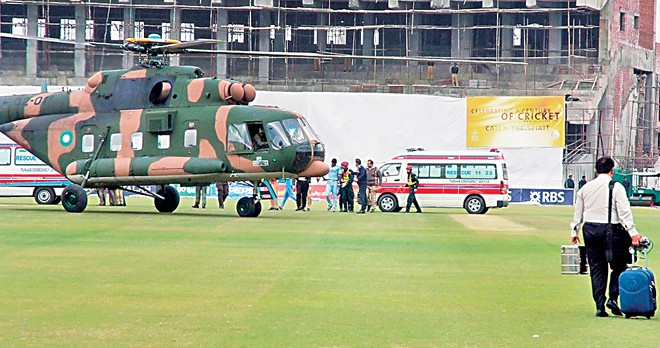

An armoured vehicle is patrolling a favela in Rio de Janeiro. Armed police guide national teams through streets that are cordoned off in this enthralling city. Poverty and wealth are uneasy neighbours, the fuse of a powder keg ready to explode. Months of demonstrations, of civil unrest, of violence and protests, have been an unexpected build-up. Nonetheless a government struggling for control is welcoming the world and promising a safe passage for the planet’s richest sportsmen and their wide-eyed supporters. This is perhaps how sport should be, crashing directly into the rocks of social division. Brazil, in football, is the prime example of sport as national expression, a representation of the ambitions of Brazilian people within a complex sociopolitical environment.
The World Cup, this glorious showcase for the beautiful game, was never in doubt. No security issue is considered too hazardous, no stadium is declared too unready. High-profile international sport in a volatile country is possible. We all know that it is. A successful tournament may even heal some of the social wounds and conflict that now threaten Brazil’s favourite sport.
A similar argument once seemed reasonable when discussing international cricket teams touring Pakistan. The security threats were containable. The benefits to Pakistan cricket and society in general far outstripped the remote, almost non-existent, risk of harm.
Three incidents destroyed any such logic. In 2002, a bomb exploded outside the Sheraton Hotel in Karachi. Bombs are no longer unusual in Karachi, but this bomb detonated when the New Zealand cricket team was staying at the hotel. The Kiwis immediately returned home. Six years later and several hundred miles to the south east, a group of young men of Pakistani origin terrorised Mumbai. Cricket was an irrelevance, but cricketing relations between India and Pakistan became collateral damage.
Pakistan cricket, threatened with isolation in 2009, welcomed friends from Sri Lanka to demonstrate the safety of Pakistan as an international venue. Presidential-level security was offered, although this was moot, given the safety of Benazir Bhutto had been impossible to guarantee two years earlier. In the middle of the second Test in Lahore, near the Gaddafi Stadium, the home of Pakistan cricket, Sri Lanka’s team bus was attacked, security men and bystanders were killed, and five players were injured. Sri Lanka went home and took international cricket with them.
Rather than sadness, it has become a blessed relief that international teams no longer risk tours to Pakistan. The risk of harm to players has far outstripped any possible benefits. No sport, no public morale boost, no symbolic hand of friendship deserves such folly. Ireland’s pursuit of Test status and international acceptance does not require a suicide mission to Pakistan, where an alarming level of violence and terrorism is now the norm.
Other countries are also unsettled. Take Brazil, for example. But any promises of security from the Pakistan Cricket Board or the government are worthless. We saw it with Sri Lanka’s cricketers and their presidential-level security. We saw it again at Karachi’s airport.
High-profile international sport is now impossible in Pakistan. It was once hard to imagine that cricketers could be terrorist targets but they seem obvious ones now. This is the moment, the tipping point, the point of no return.
A recently published report on urbanisation in Pakistan suggests that a third of Karachi is controlled by the Taliban. Rapid urbanisation of Karachi, other cities, and even some rural areas in Pakistan will create a fertile environment for more extremism unless measures are adopted now, says the report by the Wilson Center. Some of these measures are immediate but others are deep-rooted and long-term. Nothing will change in Pakistan fast, and by 2050 the Pakistani population will have reached 380 million. How is it possible for security to return quickly to Pakistan under these circumstances? Even if the correct strategies are adopted now, the benefits may not be realised for another two or three generations. Pakistan’s security crisis has sunk so low, its sociopolitical circumstances are now so out of control, that there is no quick fix, no guarantee of safety.
Cricket may be doomed in the short -- and even medium term, but Pakistanis are a resilient people, as their current cricketing exile has proved. Any prescription for recovery is a painful one but must centre on developing Pakistan’s international base in the UAE to keep the national team competitive. Pakistan should also look again at England as an alternative home venue where support is strong.
Reinvigorating domestic cricket is a second strategic strand, so that it develops players, attracts sponsors and helps sustain the cricket board. Players who have scored centuries in Pakistan’s domestic cricket go to play club cricket in England and struggle.
Finally, players must seize opportunities for development in other cricket nations, and the PCB must not be an obstacle here. If other national boards are genuinely willing to help Pakistan, why don’t they allow a Pakistan A team to enter their domestic first-class competitions, for example? Clearly the long-term solutions are sociopolitical ones but the PCB needs to take a pragmatic view and accept the grim reality of Pakistan’s ongoing security crisis.
Urging international teams to tour Pakistan is a futile exercise, a public-relations stunt, a show of misplaced bravado. The salvation of Pakistan cricket relies on other, more urgent and painstaking survival strategies.